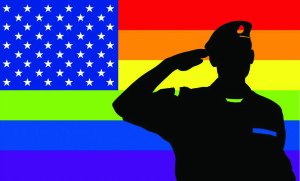EI hosts panel regarding service of transgendered individuals in U.S. military
 By Chris Dellana, Staff Writer
By Chris Dellana, Staff Writer
On the night of March 18, Gettysburg College, thanks to the efforts of The Eisenhower Institute, ALLies, and LGBTQA Advising, hosted a unique forum-based discussion regarding the service of transgender individuals in the U.S. military.
Members of the campus community—including faculty and students—attended the event, as well as others interested in the topic from as far away as New York and Dickinson College in Carlisle.
Opening the conversation was Janet Morgan Riggs, who discussed the role of ROTC student individuals at Gettysburg College. She discussed the fact that the U.S. Military’s former ban on the service homosexual individuals had been an obstacle in scholastic accreditation of the ROTC in past years.
Last spring, however, the issue came to a head in the aftermath of the military’s repeal of “Don’t Ask Don’t Tell.” Gettysburg senior and cadet leader of the ROTC Benjamin Flanders and junior and Allies President Adrienne Ellis followed President Riggs’ introduction and touched on the discussions their two groups engaged in regarding gays and lesbians in the military.
“We all grew as people and as an institution,” Ellis said.
Flanders stressed how the “learning and communication,” engendered by the regular interactions “are lessons and takeaways” that have led to better understanding and cooperation between two groups that have historically maintained a tense relationship.
Although the repeal of “Don’t Ask, Don’t Tell” allowed homosexual individuals to serve openly in the military, the military has failed to extend the same liberties to transgender individuals.
The issue of transgender individuals goes to the very heart of the U.S. Military’s constitution in that it seeks to exact change in favor of the individual and not, as posited by Doctor Chris Shumaker, colonel emeritus, in the favor of the collective.
Because the issue of transgender personnel serving openly in the U.S. Military is individual in nature, Shumaker asserts that the two groups (those in support and those against transgender inclusion) have continued to “frame this debate looking at importance from very different perspectives.”
Logic would perhaps question what the difference is between allowing other segmented populations to serve openly in the military (among them: different races, women, gays, and lesbians) and affording the same privilege to transgender individuals. Beyond the potential for disturbing the established comfort level within the organization, it comes down to an issue of medical health.
“The physiology [must be] in line with their psychology,” Shumaker said. Given that the military does not and has never brought in those with pre-existing conditions, transgender people have been grouped into this category.
Canada, by contrast, ceased codified hostility against gays in lesbians with the 1992 repeal of “Sexual Abnormality Investigation, Medical Examination and Disposal.” Since then, Canada has also integrated transgender
